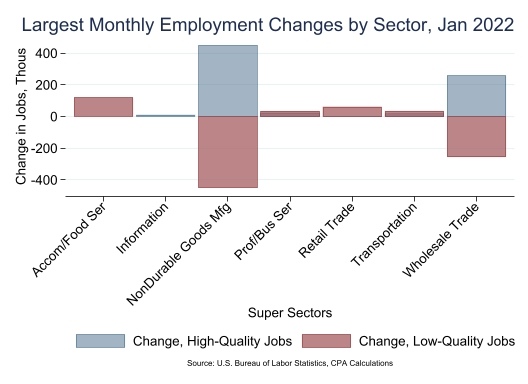WASHINGTON — The Coalition for a Prosperous America (CPA) today announced that the U.S. Private Sector Job Quality Index (JQI) rose to 80.45 in January, up 0.81% from the previous month, reflecting a rise in high-wage jobs that exceeded the rise in low-wage jobs in the month. While the strongest increase in jobs was the increase of 121,900 workers in the accommodations and food services sector, workers in the plastics manufacturing sector and miscellaneous wholesale trades saw wage increases that moved them into the high-quality segment of the JQI labor force, pushing up the aggregate JQI (see bar graph below). High-quality jobs are those that pay above the average weekly wage, while low-quality jobs pay below the average.

The Bureau of Labor Statistics reported today that the U.S. added 678,000 workers to payrolls in February. Job growth continues to be strong, reflecting an economy that is emerging from the COVID pandemic, generating new demand for workers, especially in services. Although employers continue to report difficulties in finding people to hire, the strong monthly number, following last month’s figure of 467,000 jobs added, shows that the workforce is continuing to grow.
The manufacturing sector added 36,000 jobs, to reach 12.607 million employees in February. That figure is still 178,000 below the pre-pandemic February 2020 figure. Manufacturing employment growth was notably strong in fabricated metals and machinery, while the motor vehicle sector lost 18,000 jobs in the month, likely linked to layoffs because of shortages of parts and components. All three sectors are high-quality job sectors.
The JQI report shows that in January, the mean weekly income of all U.S. private sector production and nonsupervisory workers fell 0.10% to $909.83. On an annual basis, that figure is up 5.24% over the January 2021 level, showing that total production and nonsupervisory wages are rising at or slightly below the current annual rate of inflation, which was 7.5% in January. However, sectors that lost workers during the pandemic are still offering large wage increases to attract workers. Sectors that showed a year-on-year weekly wage increase over 10% included Drinking Places, Restaurants (both Full Service and Limited Service), and Security Services. The Traveler Accommodation (i.e. hotel staff and similar) sector showed a stunning weekly wage increase of 30.13%. Even after that increase, though, weekly wages in this sector were still only $564.21, illustrating the huge difference between many low-quality and high-quality sectors.
“The Job Quality Index continues to reflect the growth in low-quality jobs and although some low-quality jobs are enjoying rising real wages, the U.S. economy still needs structural change to deliver durably higher wages to a majority of nonsupervisory American workers,” said CPA chief economist Jeff Ferry. “With high inflation threatening to go higher in light of the Ukraine war, the Biden administration and the Federal Reserve face a daunting challenge to manage inflation down while preserving economic growth and recovery from the pandemic.”
The Job Quality Index measures job quality for U.S. production and non-supervisory workers by comparing workers’ weekly wages to the mean weekly wage for all non-supervisory workers. Those jobs above the mean are classified as high-quality and those below the mean are low-quality.













